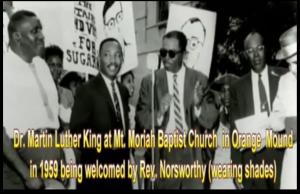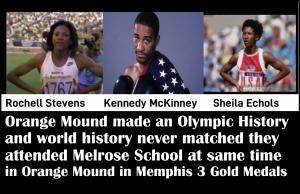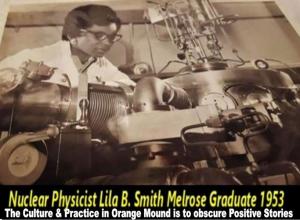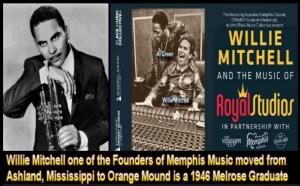Orange Mound A Historic Black Community in Memphis Honoring Dr. King's Legacy 'BirthPlace of African Cultural Diplomacy'

Anthony "Amp" Elmore Sr. Memphis 1st 35mm Theatrical Independent Filmmaker 5 Time World Kickboxing Champion uplifts the Memphis African/American Community of Orange Mound via making the Orange Mound Community Nationally known as Birthplace of African Cultural Diplomacy

There is a planned strategy not to tell Orange Mound History Dr. King at Mt Moriah Baptist Church in Orange Mound 1959 Supporting the Volunteer ticket the Church was Bombed in 1958 for Hosting NAACP meeting Dr. King loved Orange Mound he would get his hair cut & Eat.

America watched the Paris Olympics the planned strategy in Memphis obscure & attenuate Orange Mound's History to lessen Black Pride Feed the Community with negative images demoralize the community & lesson Black Pride & Obscure Black History Culture positive Thinking
"Amp" Elmore Memphis born Kickboxing Champ Filmmaker, Historian Honors King's Legacy Fights Memphis Racial Injustice, Change Negative Narrative of Orange Mound
From 1957 until his death in Memphis, Dr. Martin Luther King Jr. was a member of the American Committee on Africa (A.C.O.A.). In his final speech in Memphis on April 3, 1968, Dr. King mentioned Johannesburg, South Africa, Accra, Ghana, and Nairobi, Kenya. On May 13, 1959, Dr. King and the Southern Christian Leadership Conference (S.C.L.C.) sponsored a Freedom Dinner for African independence activist Tom Mboya. At this event, Dr. King stated, “Our struggle is not an isolated struggle. We are all caught in an inescapable network of mutuality.”
Anthony "Amp" Elmore Sr. relaunched his customary 3 mile run through his historic African/American community of "Orange Mound" a community plagued by White Supremacy, injustice and Black on Black Racism. Orange Mound is the 1st planned Community in America built for Blacks by Blacks whose history can be traced to two Black Churches whose origin dates back to 1879. In 2016 1st Lady Michelle Obama named Orange Mound "A Preserved American Community."
In a July 2, 2015 statement this is what President Barack Obama said about Orange Mound: "As the first community developed in the United States to enable African-Americans to purchase land and homes, it played a groundbreaking role in driving progress at a difficult time." While President Obama mention Orange Mound and Michelle Obama named "Orange Mound a "Preserve American Community" Anthony "Amp" Elmore Sr. is creating the movement to officially characterize "Orange Mound BirthPlace of African Cultural Diplomacy."
In the reflective video titled “The Dinner Scene,” Anthony “Amp” Elmore portrays himself, revisiting his experiences as a Hamilton High School student in Memphis back in 1971. As a young community activist, he spearheaded the first voter registration drive for 18-year-olds in Tennessee, embracing his African heritage and lifestyle. The video also features his brothers, who were returning marine soldiers from Vietnam, and his father, portrayed by the late Tommy Lee Ray. Despite his father’s initial skepticism about Elmore’s interest in the then-novel martial art of Karate, Elmore’s journey has now come full circle.
Fast forward fifty-three years, Elmore, a five-time World Kickboxing Champion in the 1990s, has taken his late father, William Frank Elmore, to Kenya three times, along with many other African Americans. Currently, Elmore is dedicated to securing recognition for his community of Orange Mound—his home since 1972—as a place that honors Dr. King’s legacy and proudly stands as the “Birthplace of African Cultural Diplomacy.”
Anthony “Amp” Elmore Sr. and his son, Anthony “Amp” Elmore Jr., are embarking on a significant journey to Kenya, Africa, from August 22 to September 1, 2024. Their trip is part of an African and African/American Cultural Diplomatic Mission, aiming to foster cultural ties and understanding. During this time, from August 25 to September 1, Anthony “Amp” Elmore Sr. is honored to be invited as a speaker and special guest at FESTAC 2024 in Kisumu City, Kenya. This festival is renowned as the world’s largest celebration of Black and African art and culture.
The effort to get Orange Mound recognized as “The Birthplace of African Cultural Diplomacy” is an uphill climb. Elmore faces a culture of white supremacy, racism, and black-on-black racism in Orange Mound, which is often seen as a symbol of self-degradation. The history of Orange Mound remains obscure, unacknowledged, and downplayed.
Orange Mound is part of a planned racist strategy to degrade and demoralize the community, making positive stories and its history elusive. A community is measured by how it values its history and culture, and Orange Mound has some of America’s most remarkable history, yet it remains obscure. In Memphis, Orange Mound faces some of the worst property decline of any community in America.
Elmore’s effort to get Orange Mound noted as “The Birthplace of African Cultural Diplomacy” is a bold and daring endeavor. He aims to associate Orange Mound beyond the current narrow, racist culture and practices, bringing it in line with the 21st century of hope and change, as demonstrated in Kamala Harris’s presidential race. Elmore envisions both Blacks and Whites in America appreciating Orange Mound not just as a Black community in Memphis, but as one of America’s historic communities.
Click here see video Orange Mound Birthplace of African Cultural Diplomacy. Anthony "Amp" Elmore, a passionate advocate for African and African-American history, has taken on a significant mission. He seeks to elevate Orange Mound—a historic neighborhood in Memphis, Tennessee—to a community known as "The birthplace of African Cultural Diplomacy." His efforts are not merely symbolic; they challenge deeply entrenched narratives and power structures.
Orange Mound faced planned and systematic racism whereas the community once had a 5 acre park, a swimming pool whereas a white dominated City council sold the parks land to Mid-South Refrigerated Warehouse Company. Noted as the 2nd largest community Black Community in America Whites closed the community's Jr. high school and bused Black youth out of the Community.
In regards to making "Orange Mound the Birthplace of African Cultural Diplomacy" Hollywood played a significant role in shaping perceptions of Africa. Johnny Weissmuller’s portrayal of Tarzan—the “Great White Ape Man” as the jungle’s king—reinforced harmful stereotypes. Black Americans were bombarded with images that portrayed Africa as primitive, exotic, and inferior. This erasure of African heritage perpetuated self-hate and disconnection.
In 1968, Dr. Martin Luther King Jr.'s assassination left Black America reeling. The loss of Dr. King created a void, and many felt directionless. Amid this turmoil, a young man—James Brown—recognized the lack of pride and self-respect among Black people. He penned lyrics on a napkin, creating a call-and-response anthem.
James Brown’s song, “Say It Loud – I’m Black and I’m Proud,” became a rallying cry. Children’s voices echoed the chorus, affirming Black identity and resilience. The song challenged the derogatory term “colored” and transformed it into a powerful declaration of pride. It shifted the narrative forever.
Anthony "Amp" Elmore Sr.'s mission to recognize Orange Mound’s significance is a courageous act of cultural reclamation. By challenging historical injustices, Elmore honors the resilience of a community and reminds us that pride in Black heritage is essential.
Elmore shares another history that is forgotten in America. The term “African American” was officially adopted on December 21, 1988, when civil rights leader Jesse Jackson and a group of Black leaders held a news conference in Chicago to announce their preference for this term over "Black". Jackson argued that “African American” provided a sense of cultural integrity and historical context, aligning with how other ethnic groups in the United States identify with their ancestral lands. This shift was part of a broader effort to foster a sense of ethnic identity among Black Americans, reflecting a maturity in cultural self-awareness.
Before this adoption, terms like “Negro” and “Black” were commonly used, but they did not fully capture the rich heritage and history of people of African descent in America. The term “African American” aimed to bridge this gap, connecting the community to its African roots while acknowledging its unique American experience. Despite this, not all Black people identify with Africa or Africans, highlighting the diverse perspectives within the community.
Civil Rights leader Jesse Jackson’s advocacy in the late 1980s that brought the term African/America into widespread use, marking a significant moment in the ongoing evolution of racial and cultural identity in the United States.
Anthony “Amp” Elmore, a pioneer in the Memphis kickboxing scene, recounts the groundbreaking moment in 1979 at the Olivet Baptist Church Gym in Orange Mound. It was there that he organized the first kickboxing event in Memphis, uniting Black and White karate fighters in the sport. This event set the stage for Elmore’s promotion of the first official Professional Karate Association (PKA) bout in October 1981, which was broadcast on the then-new cable channel ESPN, owned by Getty Oil Company. As Memphis aspired to be recognized as a “Sports City,” Elmore played a crucial role in meeting with city leaders, including Mayor Wyette Chandler, to ensure the event met ESPN’s technical requirements.
Elmore’s involvement extended beyond promotion; he meticulously coordinated with ESPN’s director to ensure every aspect of the fight promotion was perfect. His efforts included managing logistics when the ESPN truck arrived in Memphis and even later visiting ESPN’s headquarters in Bristol, Connecticut, to deepen his understanding of television production. Elmore’s Kickboxing led an opportunity to bring Memphis title televised by NBC Sports World. Memphis Mayor Dick Hackett rallied local business support for Elmore to no avail, the prevailing Southern norms of the time hindered the backing of a Black World Champion.
Nevertheless, Elmore’s tenacity and charisma earned him the distinction of being the first Black person and kickboxer in American history to secure sponsorship from a major corporation, the Adolph Coors Company. Although local support was lacking, Elmore’s influence was undeniable, leading Memphis Magazine in 1983 to name him one of the 100 most influential Memphians, a testament to his impact on the city’s sports and cultural landscape.
The very fact that Anthony "Amp" Elmore can advocate for the African/American Community in Memphis of Orange Mound to be noted as "The Birthplace of African Diplomacy" is a matter of "Providence" as noted by Elmore. Elmore explains I am not that smart or so skillful, however I can account that the Gods or luck are working in my favor.
Elmore was the 1st in Memphis to produce Memphis Kickboxing events on B.E.T. or Black Entertainment Television in 1986. Elmore notes that it is phenomenal that I pulled off making an independent 35mm theatrical Film in 1988. As stated earlier Black people in America did not become African/American until 1988 whereas Elmore's Memphis produced movie "The Contemporary Gladiator" premiered in Africa in the Country of Kenya in 1990. Elmore's film "The Contemporary Gladiator is the 1st Kickboxing film in World Film history is an untold "Orange Mound" positive story not recognized in Memphis.
Elmore highlights the global attention garnered by the 2024 Paris Olympics, where the world witnessed the beauty of Black women proudly showcasing their “Black Hair and beauty” Amidst the games, a controversial moment arose when Parisian sportscasters labeled the Black basketball star, Step Curry, as a “Devil.” Defying this, Curry embraced what was termed “Demon Mode,” delivering an extraordinary performance by scoring 24 points. Remarkably in the 1988 olympics the community of Orange Mound saw three of its own, all alumni of Melrose School, ascend as Gold Medalists—a feat for a neighborhood that contrasts with countries yet to celebrate their first Olympic gold.
Elmore recalls the 1988 Summer Olympics in Seoul, where alongside renowned athletes like Florence Griffin Joyner and Evelyn Ashford, Orange Mound’s Sheila Echols contributed to the Gold Medal victory, and Kennedy Mckinley secured gold. In parallel to these achievements, Anthony “Amp” Elmore released Memphis’ first independent 35mm theatrical film, “The Contemporary Gladiator,” in August 1988. Despite the film’s significance, Memphis Shelby County Film Commissioner Linn Sitler struggled to accept that Memphis’ pioneering independent film was a Black film about a Black World Champion, produced in the historically Black community of Orange Mound. Elmore underscores that Memphis not only produced three Olympic Gold Medalists from Orange Mound who attended Melrose simultaneously but also celebrated the release of a Black film by Elmore, a world champion kickboxer.
Following the release of “The Contemporary Gladiator,” in 1988 White film producer Jim Jarmusch, backed by the Japanese company JVC, created a movie featuring Japanese actors titled “Mystery Train” a 1989 Film release. In a contentious move, Linn Sitler, leading the Memphis Shelby County Film Commission, along with the Shelby County Historical Commission, recognized “Mystery Train” with a historical marker at G.E. Patterson and Main Street in Memphis, erroneously crediting it as Memphis’ first independent 35mm theatrical film. This act overshadowed the true pioneering Black work of Elmore, Orange Mound and the significance of “The Contemporary Gladiator” that its contribution is racially erased from Memphis’ film history.
Elmore often reflects on a phrase commonly heard in Christian circles, “God works in mysterious ways,” and recalls Dr. Martin Luther King’s powerful words, “Truth Crushed to Earth Shall Rise again.” Elmore's 1988 film, “The Contemporary Gladiator,” premiered in Nairobi, Kenya, in 1990, leading to a hero’s welcome upon his visit in 1992, during which the late Kenyan President Daniel Arap Moi honored Elmore with the title of "African Ambassador."
A pioneer in introducing kickboxing to Kenya, Elmore was also the first to bring African American groups to the country. In 1994, he organized a soul music concert in Kenya, and the following year, he married a Kenyan woman. Although their marriage has since ended, they share a son, Anthony “Amp” Elmore Jr., who graduated from the University of Memphis in May 2024. Elmore Sr. playfully teases Amp Jr. about the possibility of meeting the “Obama Girls,” noting that both Amp Jr. and Malia Obama were born in 1998, with Malia’s birthday in July and his in October.
Elmore fondly recounts meeting their late Grandmother Sarah Obama in 2013, who affectionately claimed him as her own grandson. While Kenya has not officially recognized the Barack Obama Heritage Tour, Elmore Sr. took it upon himself to establish it, traveling through Western Kenya to pay tribute to Tom Mboya. The tour, documented in a video that has garnered over half a million views, includes a visit to the Obama family home in Kogelo. Click here to see the video Obama Heritage tour.
Elmore invites everyone to explore his website:www.orangemoundtoafrica.com which asserts that "Orange Mound is the birthplace of African Cultural Diplomacy." Elmore proudly proclaims his dedication to fostering connections between Africans and African Americans. In Orange Mound, Elmore not only created what he calls the “Most African Home in America,” but also launched the “Made in Africa Movement,” sourcing competitively made goods from Africa to support jobs, culture, and family ties across continents.
Among his initiatives in Orange Mound was the “Black History Month African Dinner,” attended by Memphis Congressman Steve Cohen, featuring traditional Kenyan dishes. Elmore’s home, known as the “Safari House Museum Education and Cultural Center,” serves as a venue for tours, cultural events like Kwanzaa, and educational lectures.
As the first person in Memphis to document Black Memphis history through his website;www.Blackmemphishistory.com Elmore’s upcoming trip to Kisumu, Kenya, underscores his commitment to making Orange Mound a hub of African Cultural Diplomacy, a mission he carries out as "Africa’s Cultural Ambassador" whereas making Orange Mound "The Birthplace of African Cultural Diplomacy."
Anthony Elmore
Black Memphis History . Com
+1 901-452-4330
email us here
Orange Mound A Black Lecture Critical Race Theory by Anthony "Amp" Elmore
Legal Disclaimer:
EIN Presswire provides this news content "as is" without warranty of any kind. We do not accept any responsibility or liability for the accuracy, content, images, videos, licenses, completeness, legality, or reliability of the information contained in this article. If you have any complaints or copyright issues related to this article, kindly contact the author above.


